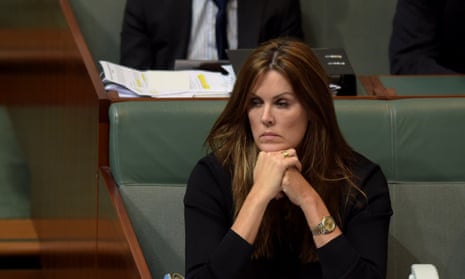“I’ve had 16 years in Canberra, and I’m pretty resilient, but it is the toughest, most masculine, most exclusionary place, and I hardly ever walk into a room where there’s more than two women.
“Nine times out of 10, here and overseas, I am the only woman. And people ask me to get the cup of tea.”
I saw a few reactions to Peta Credlin’s foray into gender politics: from relief at how openly the blokey culture of our capital is being dissected, to fury that we still struggle to get more than two women at a time in the rooms of parliament house where decisions are made.
It’s quite an extraordinary thing for a conservative woman to be talking so openly about entrenched inequality within her own party, and politics in general. Indeed our foreign minister, Julie Bishop, until the appointment of Sussan Ley the only woman sitting at the cabinet table, has only this advice for women who may encounter sexism: stop whinging.
Sadly, for some, the response to Credlin’s critique depended only on who said it: the chief of staff to prime minister Tony Abbott. In particular, one question was repeatedly raised: “What about Julia Gillard?”. What about the sexism she suffered?
This response is “whatabouttery” defined.
The same people who no doubt were among Gillard’s loudest cheerleaders during her infamous misogyny speech did not want to hear a conservative woman’s experience of gender inequality. Only the right kind of woman is allowed to suffer prejudice – and she’s not from the right.
Whatabouttery prefers a narrative centred on the evils of the bogeyman rightwing “prime minister for women”, rather than acknowledging sexist behaviour is rife in almost every nook and cranny of society, including places occupied by the political left. Feminist practitioners of whatabouttery fight their cause only when it serves them.
Unsurprisingly, it is also a rhetorical tool favoured by conservative men who want to derail a discussion about feminism, or even to deny the existence of sexism altogether.
Whatabouttery has become as certain in any feminist conversation as the backlash that is inevitably coming for Taylor Swift. Try to talk about the 18% gender pay gap in Australia and someone will inevitably question why you are stuck on western trivia and not the plight of refugee women in Syria. Talk about sexism in the workplace and you’ll be asked about housewives. Why are you leaving them out of this conversation?
It’s a kindergarten logic for people who don’t want to engage in any conversation that risks their world view. There is always room for healthy discussion but whatabouttery is so often about shutting down ideas that make people feel uncomfortable, risk their seat on their high horse or – horror of horrors! – eke away a bit of the whataboutterer’s own privilege.
At the core of whatabouttery is resentment, expressed as moral indignation. Really, we all know how much the whataboutterer is doing for the starving in Syria. How much they really care about sexism is also questionable, considering their attempted policing of the discussion.
It’s better to keep others’ experiences in perspective instead – an approach different to whatabouttery. We can acknowledge that even as Credlin experiences sexism in a privileged way, female victims of violence and poverty don’t have a similar platform.
And it’s possible to talk about the rise of “trickle down feminism” – with its focus on how many women are on corporate boards and, yes, how many women are in parliament – without dismissing out of hand the views of those who have benefited from it.
Credlin’s position as Abbott’s chief of staff has been held up as proof she cannot be on the side of women – as if the ideal scenario would be that our male prime minister, in a predominantly male cabinet, has a male chief of staff.
But isn’t her lived experience of sexism as she rose through a conservative organisation interesting? Especially given the Liberal party cites “meritocracy” every time someone dares to point out how few women it appoints to positions of power.
Here’s some real whatabouttery for you: what about the likelihood Credlin, for all her faults, has something of value to contribute to this debate?

